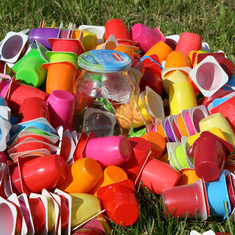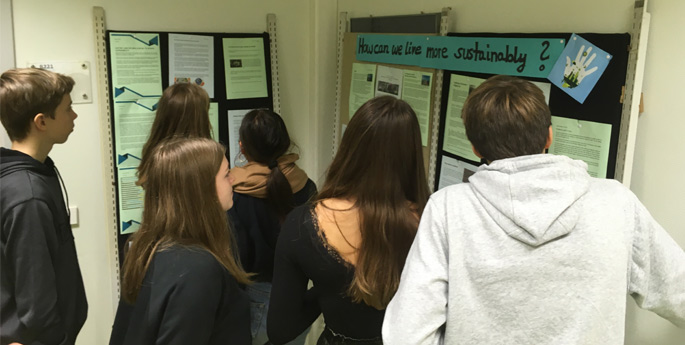Zur Vorbereitung auf den "Green Campus Day" fand in der 10c ein Schreibprojekt zum Thema Nachhaltigkeit statt.
 Die Schülerinnen und Schüler verfassten dabei Artikel zur Abfallproblematik, über die Auswirkung unterschiedlicher Ernährungsformen auf das Klima oder über nachhaltige Mobilität. Anschließend wurden die Texte im 2. Obergeschoß des Tortenstücks ausgestellt. Für die Veröffentlichung hier hat die Klasse den Text von Maja Weis ausgewählt.
Die Schülerinnen und Schüler verfassten dabei Artikel zur Abfallproblematik, über die Auswirkung unterschiedlicher Ernährungsformen auf das Klima oder über nachhaltige Mobilität. Anschließend wurden die Texte im 2. Obergeschoß des Tortenstücks ausgestellt. Für die Veröffentlichung hier hat die Klasse den Text von Maja Weis ausgewählt.
Nothing is forever - Plastic is!
Plastic is one of the most widely used and cheapest materials in the world, so you can find it nearly everywhere. In total, we use around 5 trillion plastic bags! Only 1 to 3 percent of all the plastic used are recycled. After we use them, we throw them away. Plastic pollution, caused due to plastic waste, has reached alarming heights and is increasing rapidly with every passing day. It has become a cause of global concern as it is destroying our planet.
Plastic is an important factor in people´s daily lives, so everyone uses plastic and it is just everywhere. So how did we become so addicted to plastic?
Plastic plates, bags, spoons, glasses and other material are readily available in the market. These are economical and easy to use. People prefer using these use-and-throw utensils during gatherings and parties as it shuns the hassle of clearing and cleaning the utensils later. All they need to do is to gather them and throw them away. However, plastic pollution is affecting the whole earth, including mankind, wildlife, and aquatic life. Not just plastic utensils and carry bags, furniture and various other things made out of plastic are also used extensively world over. The United States alone throws away enough plastic bottles in a week to encircle the world 5 times.
But this plastic problem did not come out of nowhere, because plastic waste has been around for a long time. In the 1950s, there was only a small amount of trash of plastic produced. Therefore, this amount of plastic has evolved over the past few years. So nowadays we produce about 300 million tons of plastic waste every year, that is nearly equivalent to the entire human population!
But how is plastic pollution impacting the earth?
Firstly, it is polluting our water. This causes a shortage of clean water and thus we cannot have enough supply for all. Moreover, it is also ruining our soils and lands. The soil fertility is depleting and disease-carrying insects are collecting in landfills of plastic. The plastic takes centuries to decompose, but the resulting micro-plastic is really dangerous to humans and animals.
So what should we do against plastic pollution? Reduce your own plastic waste. Bring your own reusable shopping bags to markets, and avoid using single-use plastic bags. Bring your own reusable coffee cup when going out to get beverages. Recycle the plastics you use and no longer need. Return single-use bags to grocery stores for them to recycle.
If everyone contributes a little bit to reuse and to the reduction of plastic, we can make a big difference.

